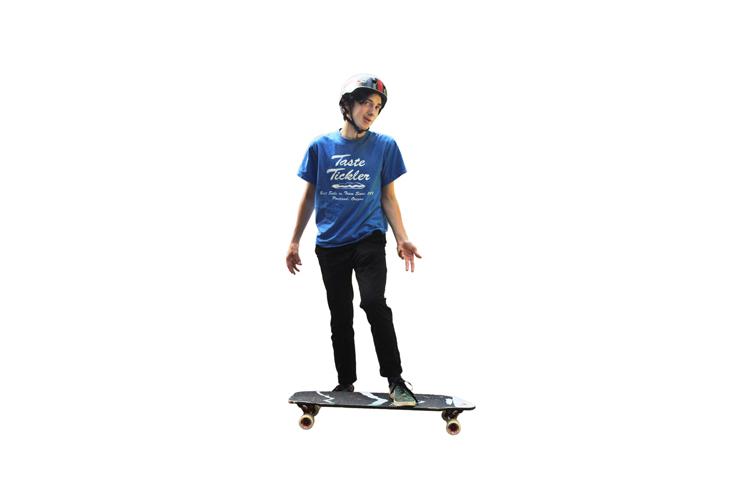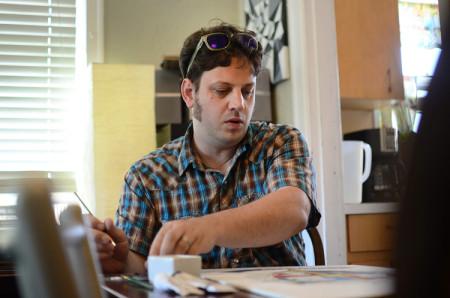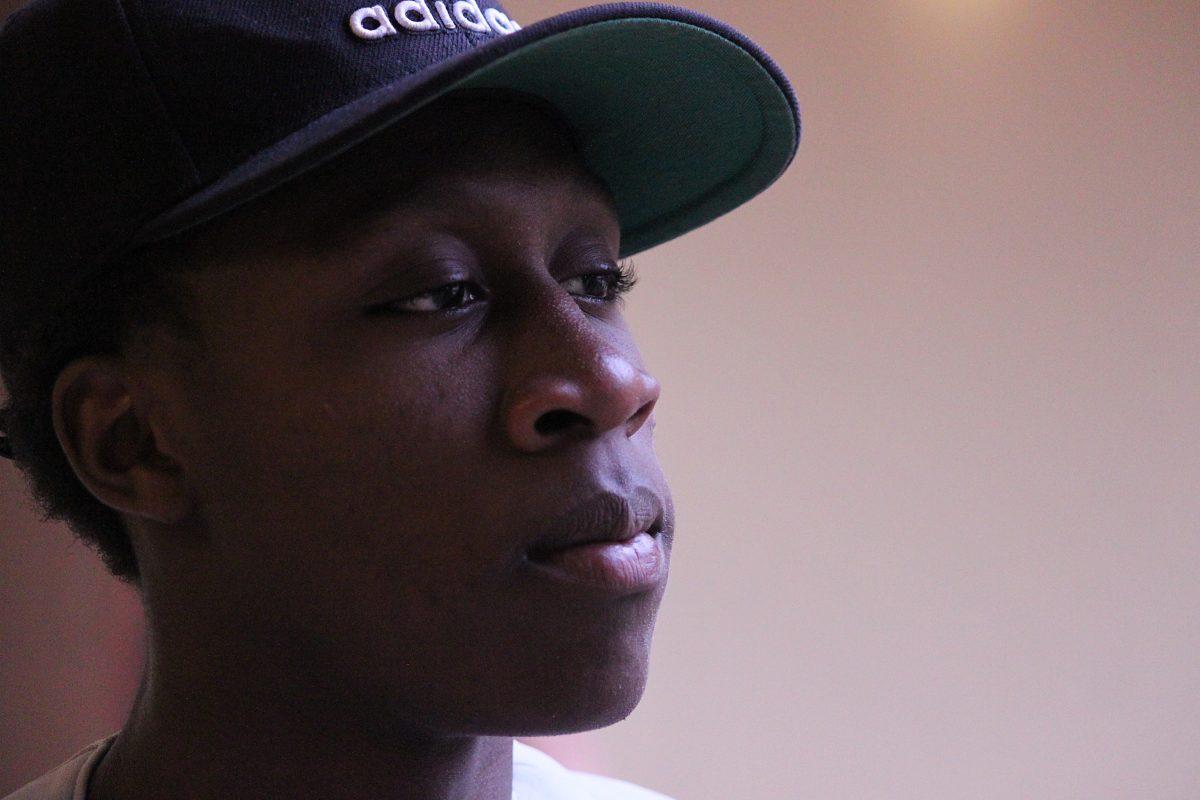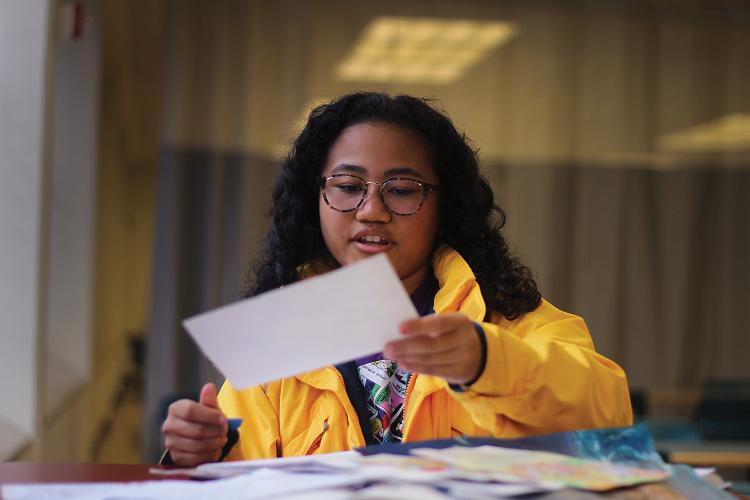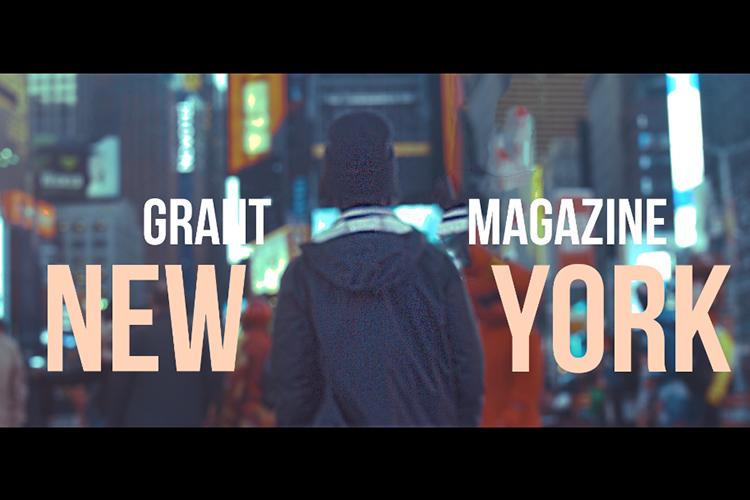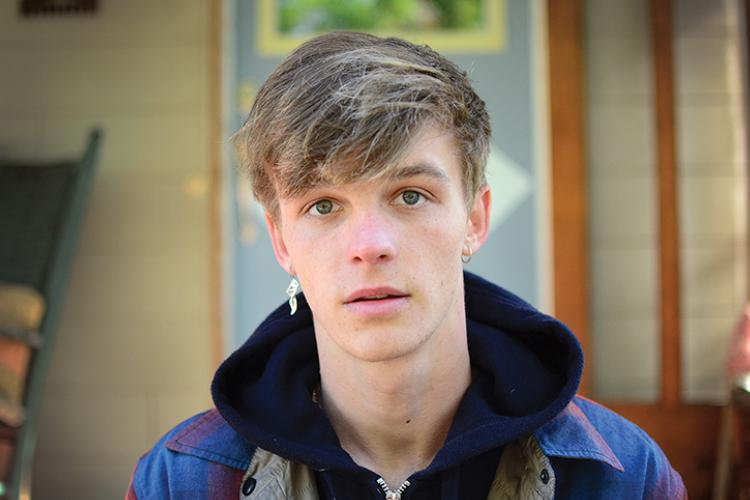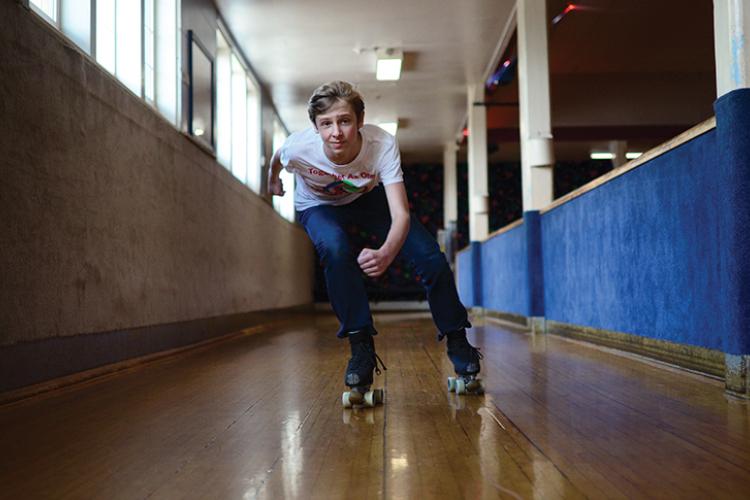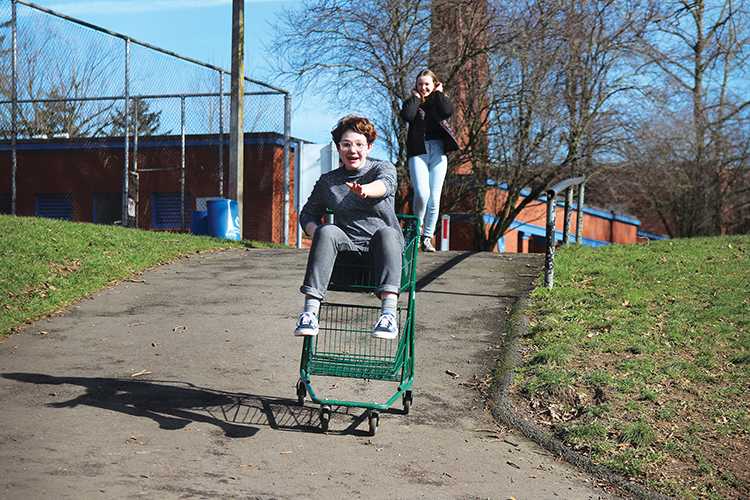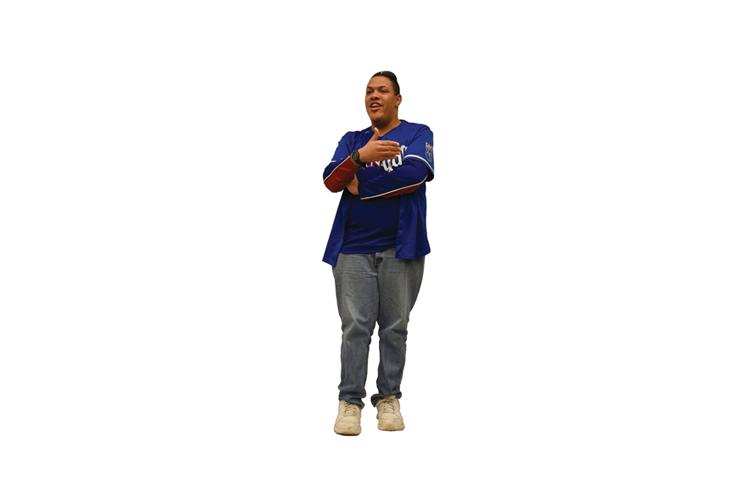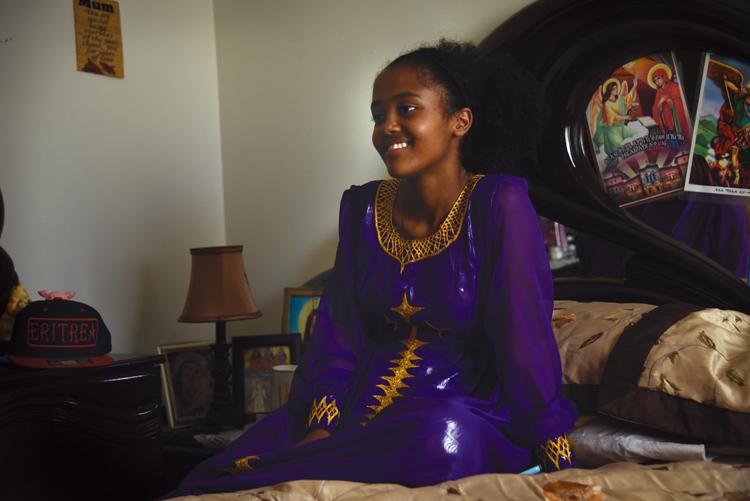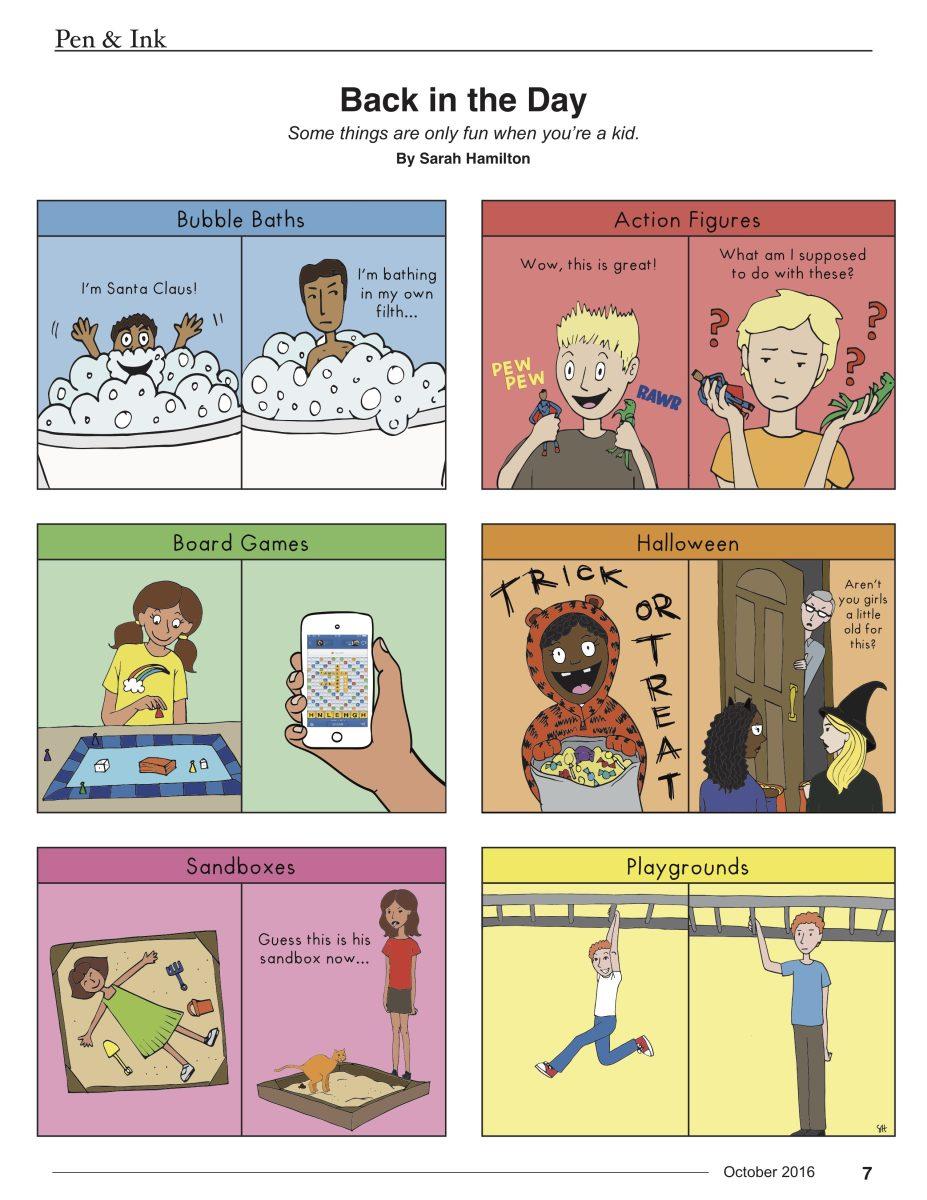Grant sophomore Haleigh Tjensvold leans against the outside of a building, catching her breath from the short sprint she ran to catch her bus. She checks the time on her phone and boards the No. 45 to Tigard. It’s the second bus she rides to get to Beaverton.
Forty minutes later, she enters Beaverton Dance Center, a non-descript building on the edge of an office park. Her hip-hop class is still stretching when she arrives, and 15-year-old Tjensvold makes a beeline to her friends stretching by the wall-length mirror. She greets them with hugs and takes a seat.
Tjensvold makes the nearly two-hour trip four days a week. Some days, when it would take too long to get home, she spends the night with her grandmother in West Linn.
She can’t imagine doing anything else. “Dance is my life,” she says. “It kind of gets my head out of thinking about things… it forces me to not think at all and just dance.”
Beyond her life in dance, Tjensvold shares a close relationship with her mom, Allison Bailey. Together, they have struggled to deal with Tjensvold’s father, who has battled alcoholism since before she was born. Because of her limited contact with him, she isn’t talking to him currently.
Her mother, who raised her, is the first person Tjensvold turns to in times of need. “I always knew I could count on her for everything,” Tjensvold says.

She also feels she can rely on her community in dance when she needs more support or someone to talk to. “If I needed to talk, if I needed a hug… my friends were always there when I needed them to be,” she says. It’s given her a space where she could leave her problems behind.
Her dance team is “like a family. It’s… a safe place where I can just be myself,” she says.
Tjensvold was born Jan. 12, 2001, in Portland. When she was ten months old, her parents split up. “I left him because I knew in my heart that that was the best thing for (Haleigh),” Bailey says. “It’s always been about her.”
Bailey and Tjensvold moved in with her grandparents, Susan Bailey and Richard Uffelman. “We spent a lot of evenings together just the two of us and… we just, you know, really bonded from that,” says Susan Bailey.
Tjensvold was introduced to dance at an early age. When she was 2, Uffelman paid for her classes at the Hollywood Dance Studio as a Christmas present. “She loved it, and she was having fun,” Allison Bailey recalls. “She really liked being on stage… She got to be the center of attention.”
After six months of dance, Tjensvold remembers her first recital. “It was scary being on a giant stage in front of a ton of people and, you know, little kid dance,” she recalls. “No one ever really does the choreography because no one quite knows what it is, but… I did have a lot of fun doing it.”
The summer before she began preschool, she and Bailey moved into their own apartment. At the time, Tjensvold saw her father sporadically. Though her parents had shared custody, she spent most of her time with her mom. Her father continually told her he was trying to get sober, but he relapsed often, she says.
Her mother shouldered the responsibilities of both parents. “I have to be everything and protect her and kind of hold her close,” Bailey says. “So I try extra hard to take care of her heart and encourage her to do it all and change the world all by herself. It’s a battle we fight together.”
When her mom began working and couldn’t always be around, Tjensvold’s grandparents helped her stick with her passion. They drove her to and from dance practice when Bailey couldn’t and helped pay for her classes.
The summer when Tjensvold was 9, she and her dance studio performed at Disneyland through the Disney Performing Arts OnStage program. The months leading up to the performance, she had practice six days a week to perfect the routine.
Her family, including her father, came to watch. Allison Bailey organized a family dinner in celebration.
Tjensvold was on reasonably good terms with her father, and she was pleased that he came to watch the performance. It was one of the first big events of hers he had seen.
“My dad has made a lot of promises, and I don’t remember him keeping a single one,” she says. “He’s made these promises to stay clean and stay sober and come to birthday parties, and as far as I remember, he’s only been to two.”
She says her dad showed up to the dinner halfway through, intoxicated. He broke the rules of the restaurant, and when he couldn’t sit next to Tjensvold, he “threw a fit,” she remembers. He yelled at Allison Bailey, threatening to take Tjensvold away from her.
“I’d invited my dad because I hoped maybe he’d act normal for once, and then it was worse than I thought it would be… I was scared out of my mind,” Tjensvold says.
After the experience at Disneyland, Tjensvold’s relationship with her father changed. Allison Bailey filed for and won full custody. Her dad was allowed supervised visits, but Tjensvold rarely saw him.
As hard as the experience was, Tjensvold found the silver lining. “It almost made me stronger as a person because I knew what I was fighting against in the world and the exact thing I didn’t want to become, and that was him,” she says now.
Tjensvold relied heavily on her mom during this time. “It just makes it easier to know that she’s always there and always has been and always will be,” she says.
And as she entered fifth grade, Tjensvold was able to focus more heavily on dance. She asked for more classes and put more hours in at the studio.
“It kind of gets my head out of thinking about things… it forces me to not think at all and just dance” – Haleigh Tjensvold
Despite her strong connection with her mom, having an absent father still affected Tjensvold. “She would feel like there was something wrong with her because he wasn’t good to her,” Bailey says. “When other people weren’t nice to her, she took it personally.”
But the community she had in dance created a safe space for her. Dancing with the same people for hours on end helped her form strong friendships. “Having that positive energy around me made it so that I didn’t even have to talk about it to make it better,” she says. “I could… just absorb the positive energy, and it made everything so much better.”
When she got bad news about a family member during dance, she fell apart. Her team huddled around her, offering her comfort. “It almost felt like my whole world was shattering around me, and all I had left were the people that were right there in that room,” she says.
In middle school, Tjensvold began seeing her dad again on her own accord. He lives in California with his mother, and she visited over spring break and during the summer. Spending time with him was confusing. She enjoyed the visits but felt distant from him.
The last time Tjensvold saw her dad was at her eighth grade graduation.
She remembers walking on stage and being surprised when she looked out to see his face. They spent the weekend together, but it was difficult. She knew that he would have to go back to California at the end.
Tjensvold entered high school without a hitch. She took beginning dance, and at the end of her freshman year got into the advanced dance class.
Last summer, Tjensvold began dancing with the Beaverton Dance Center, a competitive company. “I find it’s going to give me more opportunities to do what I want with my life which… ultimately is dance,” she says.
She spends almost every afternoon after school at the Beaverton Dance Center. Though she joined the dance group in early August, she quickly formed a strong connection with them.
One of her dance instructors, Thomas J. Yale, notices how she brings people together. “She kinda holds everyone together even… with students that she’s not with. She’s… super motivating, always just like really positive,” he says.
On a recent Wednesday night, Tjensvold and three other girls are practicing the latest piece for their contemporary company. Their instructor circles them, offering directives where she sees fit. They practice the piece in complete silence, the only noise the muted sound of music from the room over.
“From the top,” Chelsea Shambaugh, her instructor, says. She starts the music.
Tjensvold runs from the edge of the room to the middle and crumples to her knees, an agonized expression on her face. When the other dancers come to try and pull her away, she sinks to the floor.
The other dancers pull Tjensvold into their arms, swaying with her to the music, and the dance continues.
Afterwards, Tjensvold reflected on what motivated her about the movement. “Chelsea… told us to think about something that kills us inside before we started dancing,” she says. “It put me in the mindset of the dance because I thought of what it would feel like to lose my mom… that would be the most painful thing in the world for me.” ◆






























